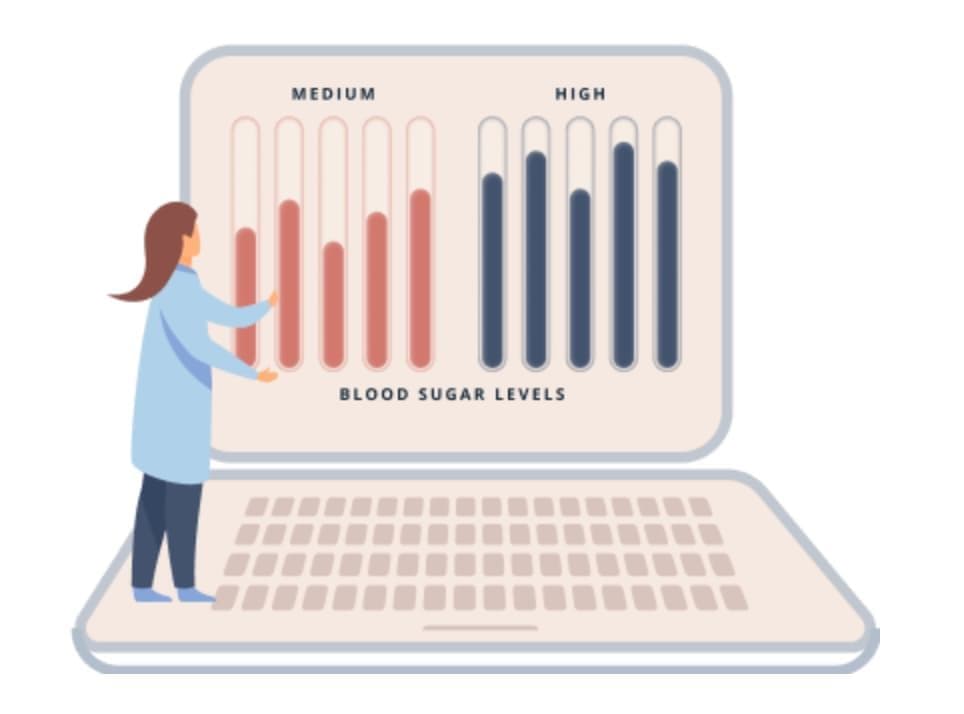This article is compiled by Sanjana Varma, a freelance writer at Proactive For Her.
What is an HbA1C test ?
An HbA1C (A1C) test measures if your body is using blood glucose well. When glucose enters the bloodstream, it binds to haemoglobin which carries blood throughout the body. Higher your blood sugar level, the more haemoglobin it binds. It’s a simple blood test that can be performed anytime without fasting. A1C gives you the average percentage of your blood sugar level for 3-4 months.
A1C percentage that is up to 5.6% or lower is considered to be normal. If it is above 5.7% to 6.5%, you may be prediabetic and higher than 6.5% means you are diabetic.
Doctors usually recommend the following additional tests to confirm a diagnosis of diabetes or to determine how well controlled your blood sugar is :
- fasting blood sugar and
- random blood sugar
- Urine testing to detect glucose
After confirmation, you may be advised to start medication along with a healthy lifestyle.
Why should I lower my A1C?
Studies have proved that lowering A1C levels can help in :
- slow the progression of diabetes.
- reduce the chances of developing nerve damage and heart disease in later life in Type 1 and Type 2 diabetes patients. I
- reducing occurence of eye diseases( cataract and loss of vision),
- strokes
- kidney diseases
Your doctor can measure the effectiveness of your medication and adjust your dosages accordingly.
How long does it take to lower my A1C levels?
Blood sugar levels can be lowered faster than HbA1C levels. Since A1C measures an average percentage of blood sugar level it needs some time to come down.
You need to stick to your diabetes management plan and it can be lowered in time.
Ways to lower your A1C levels
A1C levels can be brought down by sticking to your diabetes management plan the doctor has recommended for you. It will include:
1. Taking the medication on time:
Your doctor may prescribe tablets or insulin injection depending on the severity of your condition. Never skip a dose and reach out to your doctor if you need advice.
2. A healthy and balanced diet:
A nutritious diet is essential. Your diet should have carbohydrates, proteins, vitamins, fibre and minerals in correct proportions. Don’t heap on carbohydrates, this is very important. People with diabetes do need to eat in moderation and not avoid it. Avoid processed sugar-containing foods and drinks. Make it a habit to eat from a plate rather than munching directly from the box or packet. This will help in controlling your portion.
3. Seek the help of a clinical nutritionist :
A clinical nutritionistcan help you form a meal plan suitable for you. They will help you understand which is your healthy weight range and tell you how to reach there effectively.
4. Move your body:
Exercise is a ticket to “healthy body town”. 150 minutes of exercise every week is a must. It can be broken down into 30 minutes a day for 5 days. If your health permits, you could swap elevators for stairs and opt to walk whenever possible instead of driving or taking public transport.
Experiment with different workouts, understand your body and choose one or a combination that works best for you.Please speak with your healthcare providers before starting any workouts.
5. Regularly monitor your blood sugar:
If your doctor feels the need, they may encourage home blood sugar monitoring especially when you are starting off treatment.
Invest in a glucometer to measure your blood sugar level at the comfort of your home. Ensure you go for proper glucose blood work at least once in two months or as recommended by your doctor.
6. Track your progress:
Note down what you eat and drink in a journal. Write down your blood sugar levels daily if required and figure out the effect of your diet on your glucose levels. You can even make a note of your weight loss journey here.
The Final Word
A1C is an accurate measurement of your average blood glucose levels. Keeping it below 5.6 or at least 6% can help keep your body diabetes free or even control it effectively. Though it seems difficult, trust us it makes a big difference.
Disclaimer - This information is provided for educational purposes and should not be construed as medical advice. Please consult with your healthcare practitioners before undertaking any changes in your diet or adding supplements.
Proactive For Her is a digital clinic for women, offering accessible, personalized, and confidential healthcare solutions. We offer products and services for out-patient health concerns of Indian women, across their lifetime - from puberty to pregnancy to menopause. To know more on the sexual and reproductive health of women, visit https://www.proactiveforher.com/

